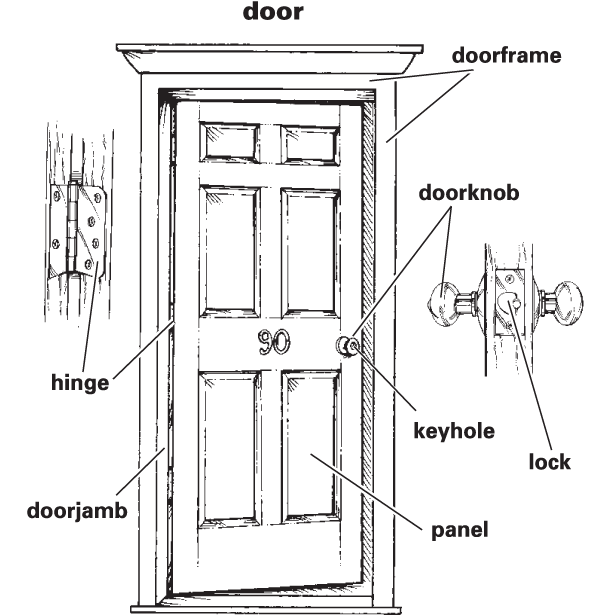
door
24 ENTRIES FOUND:
- door (noun)
- door–to–door (adjective)
- door prize (noun)
- back door (noun)
- closed–door (adjective)
- Dutch door (noun)
- French door (noun)
- next door (adverb)
- next–door (adjective)
- open–door (adjective)
- out of doors (adverb)
- revolving door (noun)
- sliding door (noun)
- stage door (noun)
- storm door (noun)
- swinging door (noun)
- close (verb)
- closed (adjective)
- darken (verb)
- death (noun)
- foot (noun)
- open (verb)
- show (verb)
- wolf (noun)
plural
doors
plural
doors
Britannica Dictionary definition of DOOR
[count]
1
a
:
a movable piece of wood, glass, or metal that swings or slides open and shut so that people can enter or leave a room, building, vehicle, etc.
—
see also back door, dutch door, french door, revolving door, storm door, trapdoor
-
open/shut/slam/lock/bolt the door
-
I heard a knock on/at the door.
-
the bedroom/bathroom/cellar door
-
The car has four doors. = It's a four-door car.
-
Leave the package at the front/back/side door. [=the door at the front/back/side of the house, building, etc.]
-
Can you answer the door? [=open the door to see who is knocking on the door or ringing the doorbell]
-
Is somebody at the door? [=knocking on the door or ringing the doorbell]
-
Let me open the door for you. = (US) Let me get the door for you.
-
(US) Can you get the door? [=can you open or close the door for me?] My hands are full.
-
an exterior/outside door [=a door that can be used to enter or leave a building]
-
an interior door [=a door inside a building; a door that connects rooms]
-
a garage door [=a large door that covers the opening through which a car enters and leaves a garage]
-
turn/pull the door handle
-
a large brass door knocker [=knocker]
b
:
a part of an object (such as piece of furniture or an appliance) that swings or slides open and shut
-
the cupboard/closet/refrigerator/oven door
2
:
the opening for a door
:
the entrance to a room or building
:
doorway
-
Please don't block the door.
-
I peeked through the open door.
-
He stood at/before the door.
-
He greeted his guests as they came in/through the door. = He greeted his guests at the door.
-
She walked out the door [=left] without saying goodbye.
-
standing (just/right) inside/outside the door [=inside/outside the room, building, etc., near the door]
3
:
a house, building, apartment, office, etc.
— used with an adverb to indicate where something is in relation to something else
—
see also door-to-door, next door
-
She lives in a house two doors down/up from me. [=there is one house between our houses]
-
The library is a few doors down from the bank. [=there are several buildings between the library and the bank]
-
We grew up two doors apart. [=with one house/apartment between our houses/apartments]
◊ If you do something (from) door to door, you do it at each of the houses, apartments, or buildings in an area.
-
Girl Scouts are selling cookies door to door. = Girl Scouts are going door to door selling cookies.
-
She went (from) door to door looking for her cat.
4
— used especially with open or unlock to describe an opportunity or possibility
—
see also out of doors
-
The grant will open new doors for our town. [=will give our town new opportunities]
-
The discovery may unlock the door to a cure for the disease.
-
The door is open (to you) if you want a better job.
-
A good education can open/unlock the door of success. [=can make success possible]
-
The patent on the product has expired, which leaves the door open for [=makes it possible for] other companies to make it.
at death's door
behind closed doors
close the door on
:
to no longer think about, consider, or accept (something)
-
I'd like to close the door on that chapter in my life.
-
The former senator says she hasn't closed the door on politics.
-
Don't close the door on your options.
close your doors
1
:
to not allow someone to enter
-
The country has closed its doors to immigrants.
2
of a business or organization
:
to close permanently
:
to stop operating
-
The museum may be forced to close its doors.
-
The store closed its doors (for the last time) last fall.
darken someone's door/doors
get your foot in the door
keep the wolf from the door
lay the blame for (something) at someone's door
:
to blame someone for (something)
-
They laid the blame for the book's failure at my door.
open doors for
open the door
open your doors
1
:
to allow someone to enter
-
The country has opened its doors to immigrants.
-
local churches that open their doors to the homeless in the winter months [=that let homeless people stay there]
2
of a business or organization
:
to open for business
:
to begin operating
-
The new store will be opening its doors next month.
show (someone) the door
:
to tell or force (someone) to leave
-
We don't tolerate bad behavior. If you cause trouble, we'll show you the door.
-
If the coach doesn't win this year, they'll show him the door. [=they'll fire him]
show/see (someone) to the door
:
to go to the door with (someone who is leaving)
-
My secretary will show you to the door. [=show you out]
— doorless
adjective-
a doorless cubicle



